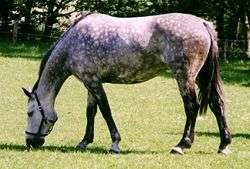ló
See also: Appendix:Variations of "lo"
Emilian
Etymology
From Vulgar Latin *illūi, from Latin illī (dative singular of ille), ultimately from Proto-Indo-European *h₂el- (“beyond, other”). Cognates include French lui.
Pronunciation
- IPA(key): /ˈlo/
- Hyphenation: ló
Related terms
Emilian personal pronouns (strong forms)
| Number | Person | Gender | Disjunctive (tonic) |
Nominative (subject) |
Accusative (direct complement) |
Dative (indirect complement) |
Reflexive (-self) |
Comitative (with) |
|---|---|---|---|---|---|---|---|---|
| Singular | First | — | mè | a | me | mêg | ||
| Second | — | tè | et | te | têg | |||
| Third | Masculine | ló | al | ge | se | sêg | ||
| Feminine | lê | la | ||||||
| Plural | First | Masculine | nuēter | a | se | nōsk | ||
| Feminine | nuētri | |||||||
| Second | Masculine | vuēter | a | ve | vōsk | |||
| Feminine | vuētri | |||||||
| Third | Masculine | lôr | i | ge | se | sêg | ||
| Feminine | el | li | ||||||
Hungarian

ló
Etymology
From Proto-Ugric *luɣe, *luwɜ, compare Mansi лув (luw, “horse”) [1][2]. Asko Parpola suggests that the Proto-Ugric word was borrowed from the extinct language of the Botai culture.[3] Also compare Tatar alaša (‘pack horse’) & Chuvash laša (‘horse’).[4]
Pronunciation
- IPA(key): [ˈloː]
Audio (file)
ló

ló
Declension
| Inflection (stem in -a-, back harmony) | ||
|---|---|---|
| singular | plural | |
| nominative | ló | lovak |
| accusative | lovat | lovakat |
| dative | lónak | lovaknak |
| instrumental | lóval | lovakkal |
| causal-final | lóért | lovakért |
| translative | lóvá | lovakká |
| terminative | lóig | lovakig |
| essive-formal | lóként | lovakként |
| essive-modal | — | — |
| inessive | lóban | lovakban |
| superessive | lovon | lovakon |
| adessive | lónál | lovaknál |
| illative | lóba | lovakba |
| sublative | lóra | lovakra |
| allative | lóhoz | lovakhoz |
| elative | lóból | lovakból |
| delative | lóról | lovakról |
| ablative | lótól | lovaktól |
| Possessive forms of ló | ||
|---|---|---|
| possessor | single possession | multiple possessions |
| 1st person sing. | lovam | lovaim |
| 2nd person sing. | lovad | lovaid |
| 3rd person sing. | lova | lovai |
| 1st person plural | lovunk | lovaink |
| 2nd person plural | lovatok | lovaitok |
| 3rd person plural | lovuk | lovaik |
Synonyms
- (animal): fogatló, gebe, hátasló, háziló, igásló, musztáng, paripa, pólópóni, póni, póniló, sportpóni, táltos, telivér, vadászpóni, vadló, versenyló
- (young animal): csikó, kiscsikó
- (male animal): apamén, csődör, fedezőmén, mén, tenyészcsődör
- (castrated male animal): herélt, paripa
- (female animal): kanca, nőstény ló
- (animal, children): kispaci, lovacska, paci
- (chess): huszár
Derived terms
Compound words
Expressions
- ajándék lónak ne nézd a fogát
- állatorvosi ló
- dolgozik, mint egy ló
- elszalad vele a ló
- lóvá tesz
See also
| Chess pieces in Hungarian · sakkfigurák, sakkbábuk (layout · text) | |||||
|---|---|---|---|---|---|
| király | vezér, királynő | bástya, torony | futó | huszár, ló | gyalog, paraszt |

References
- É. Kiss Katalin, Gerstner Károly, Hegedűs Attila: Fejezetek a magyar nyelv történetéből, Piliscsaba, 2013. →ISBN.
- “luwɜ (luγǝ)” in the Uralic Etymological Database
- Parpola, A. "The problem of Samoyed origins in the light of archaeology: On the formation and dispersal of East Uralic (Proto-Ugro-Samoyed)" (2012), p. 295-6
- "horse" Doerfer list no. 94 in Turkic Database compiled by Christopher A. Straughn
Icelandic
Pronunciation
- IPA(key): /louː/
- Rhymes: -ouː
Noun
ló f (genitive singular lóar, nominative plural lær)
Declension
Irish
Lashi
Old Norse
Etymology 1
From Proto-Germanic *lauhaz m, from Proto-Indo-European *lówkos, from the root *lewk- (“bright, to shine”).
Declension
References
- J.Fritzners ordbok over Det gamle norske sprog, dvs. norrøn ordbok ("J.Fritnzer's dictionary of the old Norwegian language, i.e. Old Norse dictionary"), on ló.
Etymology 2
Alternative forms
Declension
References
- ló in Geir T. Zoëga (1910) A Concise Dictionary of Old Icelandic, Oxford: Clarendon Press
- ló in A Concise Dictionary of Old Icelandic, G. T. Zoëga, Clarendon Press, 1910, at Internet Archive.
Vietnamese
Etymology 1
Derived terms
Derived terms
- lấp ló
- ló dạng
Etymology 2
Noun
(classifier cây) ló
- Eye dialect spelling of lúa, representing Nghệ An dialect and Hà Tĩnh dialect Vietnamese.
This article is issued from
Wiktionary.
The text is licensed under Creative
Commons - Attribution - Sharealike.
Additional terms may apply for the media files.